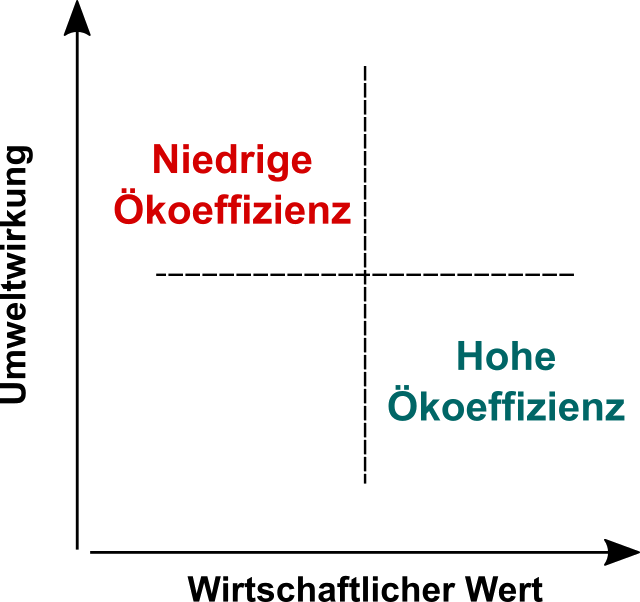Eco-efficiency expresses the relationship between environmental impacts/resource consumption and the economic value of a product for a production process. Eco-efficiency therefore stands for ecological and economic efficiency.
The overarching goal of the “Scientific Basics” sub-area is the interdisciplinary scientific treatment of agricultural production processes. The basis for individual company life cycle assessments and economic analyzes for the following applications are developed:
- Creation of evaluation systems for practical use
- Presentation of eco-efficiency and measures derived from it for agricultural production
- Ecological modernization of agricultural businesses
- Eco-design and eco-assessment for agricultural businesses
Basic publications
- Herndl , M., Baumgartner, DU, Guggenberger, T., Bystricky, M., Gaillard, G., Lansche, J., Fasching, C., Steinwidder , A., Nemecek, T., 2016:
Individual life cycle assessment of agricultural businesses in Austria. Final report, BMLFUW. - Herndl M., Marton SMRR, Baumgartner DU, Guggenberger T., Steinwidder A., Gaillard G., 2016:
The environmental performance of grassland and arable-based dairy farms – a case study from Austria. Grassland Science in Europe, 21, 59-61. - Herndl M., Baumgartner DU, Guggenberger T., Bystricky M., 2016:
Environmental impacts of selected arable farming operations in Austria: contribution analysis and improvement options. 71st ALVA conference, Krastowitz Castle Education Center , May 30-31, 2016, 155-157. - Guggenberger T., Baumgartner DU, Herndl M., Bystricky M., 2016:
Exploitation of scientific findings from life cycle assessment through the provision of information systems. 71st ALVA conference, Krastowitz Castle Education Center , May 30-31, 2016, 164-166. - Herndl , M., Baumgartner, DU, Bystricky, M., Guggenberger, T., Marton, SMRR, 2015:
Final meeting of the FarmLife project. Final report part 2, BMLFUW
Current projects - see the links to the projects below!
Development of an animal welfare assessment system for implementation in the farm management tool FarmLife
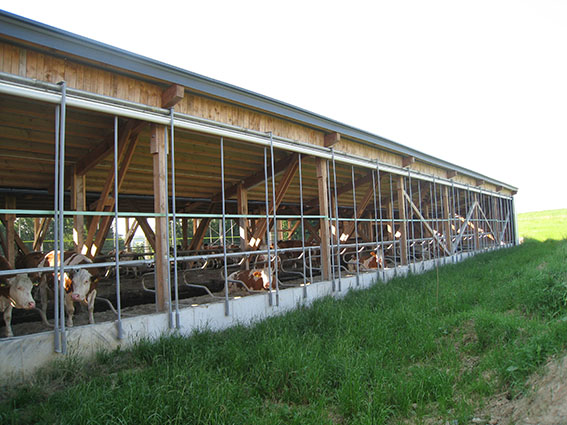
The topic of animal justice or animal welfare is becoming increasingly important in agriculture but also in social discussion, both nationally and internationally. Sustainable operational development takes into account different management levels within the system boundary.
The aim of the project is to develop suitable parameters and methods for assessing the animal welfare of husbandry systems using the example of cattle farming and to integrate them into the FarmLife farm management tool.
Practical application of the farm management tool “FarmLife” in the Liezen district model region
Dairy farms with volatile product prices and uncertain future prospects require long-term decisions. Well-prepared key operating figures promote stable and sustainable business development. In order to test the tool developed as part of "Farmlife" to support management decisions on farms in practice, dairy farms in the Liezen district model region were selected.
The following goals are pursued on both a practical and scientific level:
Practice:
- Introducing and preparing stakeholders to the operations management tool
- Acquisition of dairy farms in the Liezen district
- Workshops on data entry and operational feedback/advice
- Embedding the results in operational development concepts
Scientific:
- Impact of farm management on the environmental impact of dairy farms
- Development of recommendations for action to reduce environmental impacts
Completed projects
Farmlife - Individual life cycle assessment of agricultural businesses in Austria
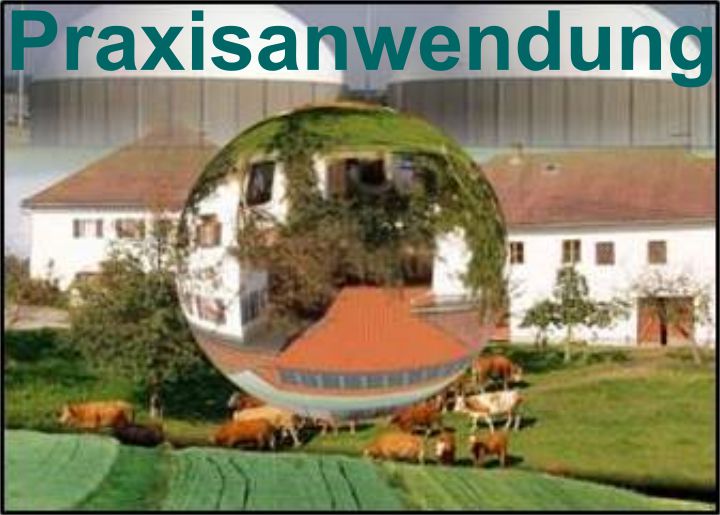
Farmers are increasingly confronted with questions about resource consumption and the environmental impact of their production systems. Both aspects are closely related to economic considerations. The combination of social demands and the change/scarcity problems expected in the future (climate impacts, energy) requires every farmer to examine their strengths and weaknesses. The aim of determining the location must be to achieve the most favorable relationship possible between economy, ecology and resource dependence.
Further information on the Farmlife project and the download of the final report on the Farmlife project part 1 and the Farmlife report part 2
Agriculture specialist atlas
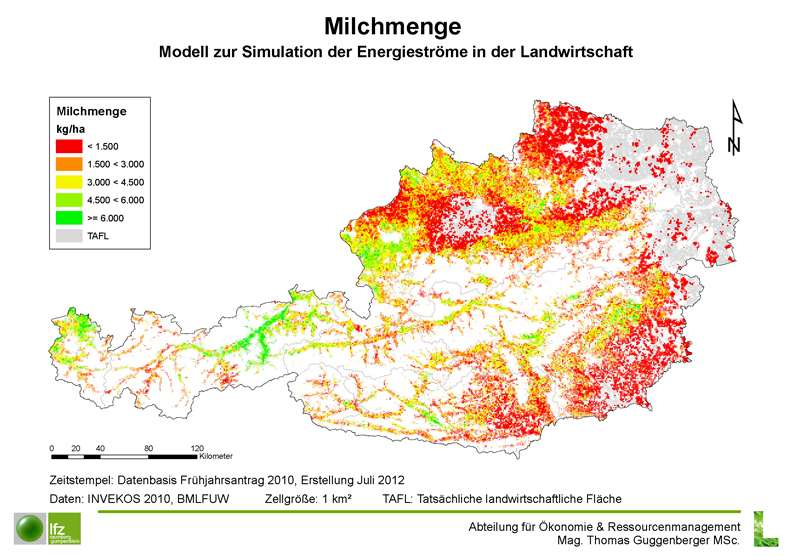
The spatial and factual structure of Austrian agriculture was examined for the Agriculture Atlas. Comprehensive data sets from the national administration and external project partners from 2010 are integrated into the structure of the model. This data forms the basis for the further assessment of material flows and an analysis of the environmental compatibility and resource efficiency of farms.
Further information on the Agriculture Atlas, including downloads, can be found at: http://www.raumberg-gumpenstein.at/ggs.html
Toolbox eco-efficiency for agricultural advisory and educational practice
A safe and sustainable introduction of life cycle assessment of agricultural operations, which not only shows their economic viability but also their environmental impacts, requires a comprehensive tool that can be used in both educational and advisory institutions.
In cooperation with the University of Agricultural and Environmental Education Vienna, a comprehensive package of teaching and learning material was developed, which is available online to every teacher at agricultural schools in Austria in the form of a Moodle course. www.farmlife.at , which was further developed at the same time for use in education and consulting, enables the use of the appropriate teaching/learning material in parallel to the interactive processing of anonymized project companies on farmlife.at .
The development steps for real operations can be worked out directly in the FarmLife tool. The links there lead to more in-depth literature.
For the Moodle course: https://www.eduacademy.at/phagrarumwelt/course/index.php?categoryid=710
Integration of the eco-efficiency tool FarmLife into the agricultural education landscape in Austria
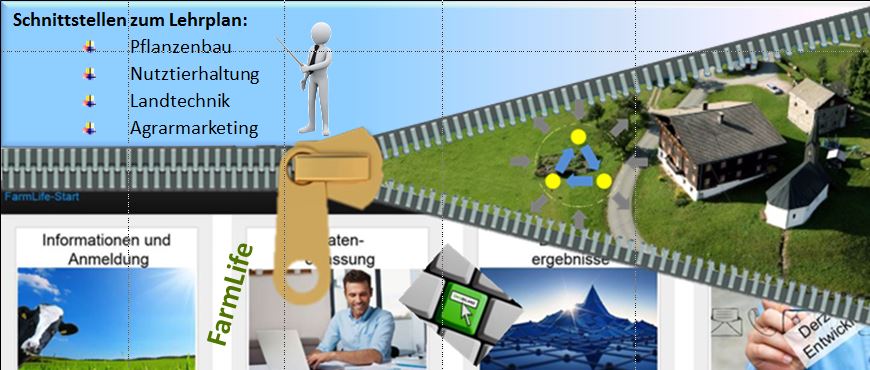
The application of FarmLife should be anchored in agricultural practice in order to promote the sustainable use of inputs as well as location-appropriate and performance-oriented farm management. FarmLife must be spread using future-determining multipliers; The use of the operations management tool, including the comprehensive educational package developed for it, should therefore be integrated into the training of the next generation.






